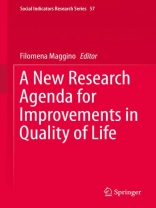This book presents a new research agenda for improvements in Quality of Life research. It includes topics such as:
-Studying Qo L in particular subpopulations and selected subgroups
-Disentangling the difficult task of identifying determinants of Qo L
-Perfectionating the measurement of conceptual dimensions
-Defining new indicators able to measure and monitor particular social conditions and shows that these are not separated fields of studies but intersect each other and produce different outcomes which can be with difficulty classifiable, consistent with the idea of the complexity of our reality.
The volume presents micro perspectives by taking into account the macro situation through both qualitative and quantitative approaches.
Spis treści
1) Well-being indicators on landscape and cultural heritage: the experience of BES project – Luigi Costanzo – Alessandra Ferrara.- 2) Determinants of student satisfaction with campus residence life at a South African university – Ferdi Botha – Jen Snowball – Vivian de Klerk – Sarah Radloff.- 3) Dimensions of quality of living: An ethnographic research in two neighbourhoods of social housing – Livia Bruscaglioni – Erika Cellini – Barbara Saracino.- 4) Making the Extraordinary Ordinary: A Fresh Look on Individual Action with Communities – Craig Talmage.- 5) Explaining the Ethnic Minority Disadvantage in Subjective Well-being: A Multilevel Analysis of European Countries – Thomas De Vroome – Marc Hooghe.- 6) Self-evaluation Affects Subjective Well-being: The Effects of Socioeconomic Status and Personality on Quality of Life in Taiwan – Hsiu-Jen Jennifer Yeh – Hsieh Yeu-Sheng – Rueyming Tsay.- 7) The Impact of Public Expenditures on Chinese Elders’ Life Satisfaction – Song Gao – Xiangyi Meng – Dayong Yang.- 8) Associated factors to leisure activities in Quality of Later Life – Gloria Fernandez-Mayoralas – Fermina Rojo-Perez – Lardies-Bosque R. – Maria Joao Forjaz – Pablo Martinez-Martin.- 9) The Incidence of the Need for Personal Assistance and Care: Objective Living Conditions and Subjective Assessments – Stefan Weick.












